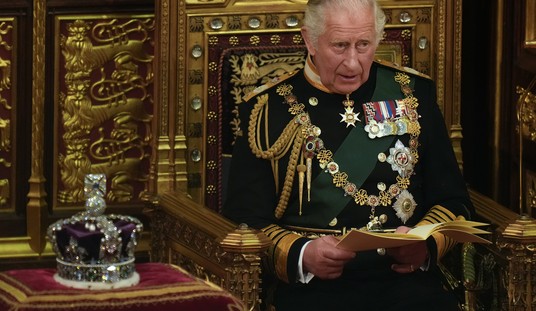Yep, says Brian Stelter. Absent compelling evidence to the contrary, I default to non-political explanations for the success or failure of political entertainment. I don’t think Oscar ratings keep dropping because the country’s tired of being lectured by smug limousine liberals. I think they keep dropping because there are more entertainment options every year for the Oscars to compete with. Do you want to devote four hours to an overwrought tribute to mostly overrated movies or do you want to spend it on one of the eight million interesting new programs debuting on Netflix this week?
I’m less sure about this one, though. I favor a non-political explanation here too but when a pro-Trump celebrity revives a famous pro-Trump character and the premiere is *about* her being pro-Trump, maybe there’s a little politics behind the mega-ratings.
The first two episodes of Roseanne, a full hour at the top of the ABC lineup, won the night by both adults 18-49 and total viewers. The show averaged a 5.1 rating in the key demo and 18.1 million viewers, rising from the first half hour to the next. The first number alone is enough to make Roseanne the highest-rated regularly scheduled scripted show of the last few seasons, since Empire at its peak, as well as the highest-rated sitcom broadcast in over three years.
That’s an incredibly strong start for the sitcom, thus far only committed to nine episodes. The easiest comparison is another revival, NBC’s Will & Grace. The other reboot, one that helped jump-start Roseanne and the current trend, premiered with a 3.0 rating in the key demo and just over 10 million viewers at the start of the season.
I know one guy who’s all too eager to read Roseanne’s success as a triumph for right-wing viewers:
Wow amazing. Congrats @therealroseanne. If you’re not too busy already maybe work in a late night show too… seems there’s some demand for an alternate viewpoint. #Rosanne https://t.co/JNaLjxS0fs
— Donald Trump Jr. (@DonaldJTrumpJr) March 28, 2018
ABC hasn’t seen numbers like last night’s for its 8 p.m. slot on Tuesday since 2006. Is that because populist red-state America showed up en masse, knowing that it would be portrayed sympathetically for once? Could be. Roseanne Barr hasn’t made a secret of her Trump support or the fact that the show would address it. The comparison with “Will & Grace” is interesting too. If it’s not politics that delivered last night’s much bigger numbers for “Roseanne,” what is it?
My non-political hunch is that it’s a combination of nostalgia plus the fact that “Roseanne” was a much bigger hit than “Will & Grace” was during its initial run. W&G was a top 20 show for four of its nine seasons and a top 10 show for just one. “Roseanne” was a top five show for its first seven seasons and a top two show in four of its first five. It was number one in 1989-90. There are simply more old “Roseanne” fans out there than “Will & Grace” fans, in all probability.
As for nostalgia, although the two shows were near-contemporaries (“Roseanne” went off the air the year before W&G debuted), the feel from memory is that they aired in different eras. “Will & Grace” is celebrated for mainstreaming gay characters, a trend that continues in entertainment today. “Roseanne” is celebrated for the sympathy and verisimilitude with which it depicted a blue-collar family, a trend that … does not continue as reliably. Because the show was so famously realistic, I think, the characters remain unusually vivid in viewers’ minds many years later. I got sidetracked last night but would have watched purely for that nostalgia factor. I know Dan and Roseanne Conner! I’ve known them for years. It’d be nice to catch up. No politics required.
But to the extent that politics are a draw, Ben Shapiro makes a smart point. Yes, Roseanne is more “real” than most sitcoms, but for Hollywood to feel sympathy for the characters requires a little cultural clean-up:
But there’s something else going on in Roseanne that should disturb conservatives: the redefinition of Trump supporters as blue collar leftists rather than conservatives. Roseanne’s character is pro-gay-marriage, pro-abortion, feminist, and pro-transgenderism — and the implication is that she is a good person because of these views. The real difference between Trump voters and Hillary voters are economic in nature, not cultural…
Television hasn’t featured a respectful depiction of a typical Republican-voting woman in decades. And Roseanne isn’t it. Roseanne could just as easily have been a Bernie supporter as a Trump supporter, because she is a class heroine, not a cultural one — and the Left believes that the only path to unity between Right and Left is to cast out the cultural right. That’s what Roseanne does implicitly.
The hallmark of the show, the reason it’s memorable for so many, wasn’t that it was fall-down funny but that it was unusually relatable. Sympathizing with the Conners is a higher priority than laughing at, or with, them. For Hollywood, that means the characters’ cultural views can only go one way. Maybe they’ll play with that a bit in future episodes; I think they might wring some “All in the Family” humor out of quiet parental reservations about the cross-dressing kid, so long as they resolve in acceptance. But abiding reservations would alienate liberals in the audience and would risk the sympathy that defines the show — even though those reservations would indisputably reflect how many real families behave. As Ben says, economic populism and cultural populism are two different things. You can find humor in each, but humor *and* sympathy? From Hollywood? It takes Archie Bunker for that.








Join the conversation as a VIP Member